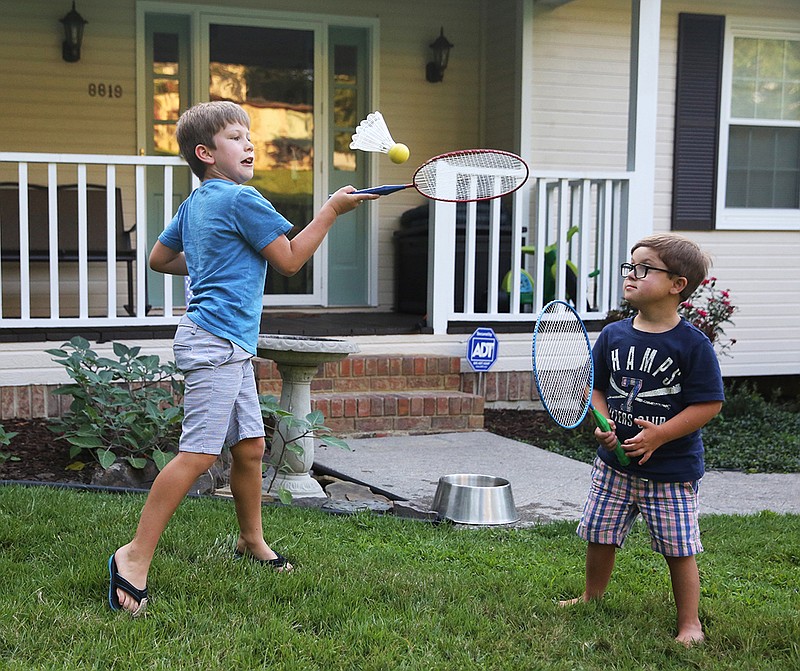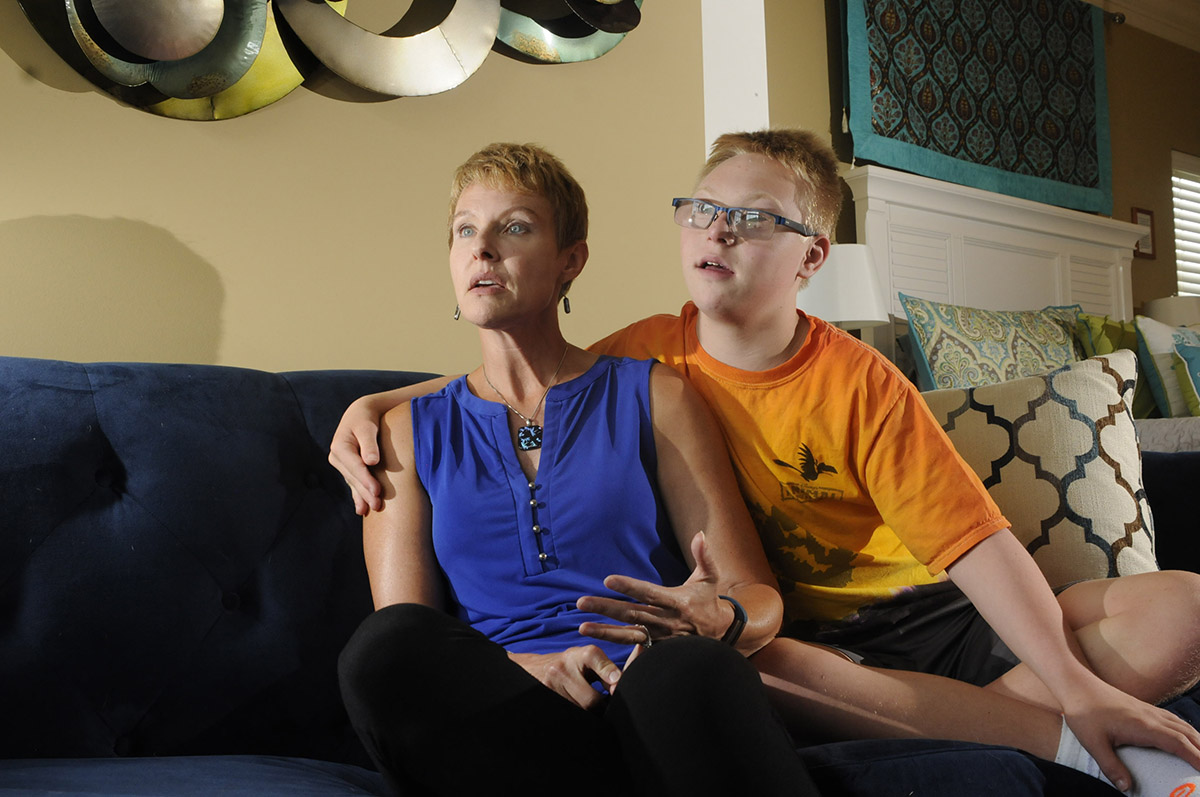Carmen Penney's 6-year-old son, Coleson, has Down syndrome. When he started kindergarten this year, he knew his colors, knew sight words, knew how to write his name, and he spent most of his days in a general education classroom at Westview Elementary.
But the Penney family's experience is an atypical one for families who have children with disabilities in Hamilton County.
When she and her husband started thinking about school for their children, Carmen Penney said they heard a lot of negative stories.
"Many people suggested we move out of the county, or even to Georgia," she said. "We heard from many families who had very negative experiences."
Instead, the family intentionally moved into the zone for Westview Elementary, a school with a positive history of inclusion of students with disabilities into general education classrooms.
But most students with disabilities in the district are bused to certain schools where they spend their days segregated from the general population.
This widespread problem, which experts say violates the Individuals with Disabilities Education Act, is what a three-year plan for inclusion presented at Thursday's school board meeting aims to address. The plan comes after years of work by a group of community advocates and organizations, the Chattanooga Inclusive Education Working Group, to partner with the district to address those needs.
The problem: 'Systemic issues' in special education
In Hamilton County, about 8,155 students are identified as having a disability, according to district data. They include learning disabilities, speech impairments, autism and other intellectual disabilities. The number also includes the more than 2,000 students who are considered gifted and have an individualized education plan, or an IEP.
Most of those students are able to perform and function with their typical peers in traditional settings but might have needs for accommodations or specific services.
However, in 2015, only about 16.5 percent of students with disabilities were spending most of their day in general education classrooms, leaving Hamilton County in the bottom 10 percent of counties in Tennessee when it came to inclusion.
"On many measures of data self-reported to the state on inclusion, we have historically been in the bottom 10 percent of the state, and that's simply unacceptable," said Cale Horne, co-chair of the drafting committee of the plan and faculty member at Covenant College. Horne is also a member of the district's Equity Task Force.
It means children have spent sometimes hours on buses being shuffled to segregated classrooms where the standards are different or nonexistent and often lack academics at all, focusing solely on life skills.
"For me, it is heartbreaking because that child's potential is lost," Carmen Penney said.
The district has also struggled with discipline practices relating to suspension rates of students with disabilities, out of compliance bullying and hazing standards, and exorbitant transportation costs related to busing students from their zoned schools to "cluster sites," or schools with comprehensive development, or segregated, classrooms.
Such problems aren't news to the district.
The Luka Hyde case
In 2017, a federal judge ruled the district had violated multiple federal guidelines protecting students with disabilities, including IDEA, the Americans with Disabilities Act and Section 504 of the Rehabilitation Act - a federal civil rights law prohibiting discrimination against individuals with disabilities.
MEMBERS OF THE THREE-YEAR PLAN DRAFTING COMMITTEE
Justin Robertson, Hamilton County SchoolsCale Horne, Chattanooga Inclusive Education Working Group, co-chairmanGarfield Adams, Hamilton County SchoolsSedara Bond, Epilepsy Foundation of Southeast TennesseeDave Buck, Chattanooga Autism CenterRobin Cayce, Chattanooga 2.0Trish Cox, parentMitzi Delker, Hamilton County SchoolsPam Hudson, Signal CentersJacob Jarvis, Chattanooga Down Syndrome SocietyDawn Jones, TN Vocational Rehabilitation Program,Logan Jones, University of Tennessee at ChattanoogaLisa Mattheiss, LifeLineLatricia Milburn, Chattanooga Down Syndrome SocietyLisa Morgan, Chattanooga Area Brain Injury AssociationTiffany Ramsey, Tn Vocational Rehabilitation ProgramTiffany Ramsey, STEP-TNShelley Salter, Prevent Child Abuse TennesseeJames Tucker, McKee Chair of Excellence, University of Tennessee at ChattanoogaRachel Westbrooks, Helen Ross McNabb CenterKim Wingate, University of Tennessee at Chattanooga
The case, which has been winding through the court system for years, is that of Luka Hyde, a then-second-grader with Down syndrome who was removed from Normal Park Elementary School in 2013. The case, which is being heard Thursday by the 6th Circuit Court of Appeals, revolves around his parents' argument he shouldn't have been removed from Normal Park and segregated from his peers in a comprehensive development classroom at Red Bank Elementary.
"When our children get out of school, there won't be separate banks they will go to, there won't be separate churches they will go to or separate schools. They will be in regular society," said Deborah Rausch, Luka's mother.
"If the child's present ability is the floor and the general education curriculum is the ceiling then special education should be the ladder that gets them there," she added, citing a previous ruling against the district in the case.
Instead of going to a segregated classroom at Red Bank, Luka has attended The Montessori School of Chattanooga, where he will be an eighth-grader this year.
"It changed our lives completely," Rausch said.
Inclusion in general education classrooms with his peers, being held to a standard curriculum, is what Rausch and her ex-husband Greg Hyde wanted for their son, and inclusion is the direction the district is heading, according to the three-year plan.
"What we want to move toward is a more inclusive environment, bottom line," said Garfield Adams, the district's new director of exception education.
The plan: All boats rise
Crafted by the working group, which was adopted as one of the main areas of concern by Chattanooga 2.0 in 2016, the plan has five priority goals, the most important of which is getting kids out of isolated classes and cluster sites and sending them to their zoned schools.
"The primary goal is that all students with disabilities attend their zoned school and implement full evidence-based inclusion as appropriate in the 2019-2020 year," Adams said.
Horne added that the goal is to push students with disabilities as much as possible into general education classes, or the "least restrictive environments" as mandated by federal law.
"Let's start with them in that general education environment and instead ask when it's appropriate to pull them out," Horne said. "In the past 40 years, there have been many studies looking at social and academic aspects of inclusion. There have been no studies that have found that it doesn't work. There have been no studies that have found that it has an adverse effect on general education students. What we see is that all boats rise."
The plan also seeks to improve the district's relationships with families, caregivers and community partners to develop opportunities for successful transitions for students with disabilities as they leave the school system and provide necessary training and support to educators.
"Even though there are systemic issues in regards to special education in Hamilton County historically, there are also bright spots," Horne said at Thursday's board meeting.
Those include schools where inclusion is not a rarity but the norm, like Westview Elementary and Brainerd High School's new model for the upcoming school year, and peer-to-peer mentor programs such as the IGNITE program at Hixson High, which has expanded to other schools.
Justin Robertson, chief of schools, who is also a co-chairman of the committee, noted that one of the most important aspects of the plan was the depth of community involvement.
"I think what's important about this situation is it wasn't one person, or even us as the district. It was the ability to put a group of experts together to listen to and get their expertise to come up with something," Robertson said. "This isn't a plan that's being cast upon us as a district, but one we developed working alongside and I feel very passionate that it's the right thing to do."
Parents like Rausch and Carmen Penney feel it's a step in the right direction, but others have concerns about the plan and how it will be rolled out.
PRIMARY GOALS
The three-year plan has five primary goals:1. To increase the time students with disabilities spend in the general education classroom2. To place every student with a disabilities in their zoned school or school of choice3. To improve communication and relationship with families and community partners4. To help students with disabilities transition to life after they leave the school system5. To support teachers and administrators throughout the transitionSource: the Three-Year Plan for Special Education in Hamilton County Schools, authored by the Chattanooga Inclusive Education Working Group
The hurdles
DJ Omarkhail is a special education teacher at Brown Middle School, where he has co-taught for nine years. Working alongside general education teachers, Omarkhail will typically provide assistance to students in the classroom, and sometimes pull them out for small-group or one-on-one support.
Next year, students entering middle or high schools who typically would have been sent to a cluster site, will instead attend their zoned school. That means Omarkhail and his colleague will have more students with a greater range of needs and abilities to work with.
"I think it is a good idea, but I have some concerns," he said. "At this point in time, there has not been adequate preparation for me as a special education teacher who has been working with students with high incidence disabilities for my entire career to be working with and responsible for students with low incidence of disabilities."
Rausch, who will be deciding where to send Luka for high school, also isn't sure if he will ever return to the public education system.
"My concern with him entering high school is that [the district] hasn't built up the bench strength," she said. "I don't want to put my child at risk to make sure they are doing it right."
Adams and Robertson both acknowledge parent concerns, noting the plan is an evolving one.
"While we certainly want to move in the direction [of inclusion], this is about communication with parents and us working with them," Robertson said. "If there are parents who are in situations and are happy, we don't want to move kids who are making progress."
Horne also emphasized that supporting teachers - and parents - will be important during the transition.
"Inclusion does not mean removing services from their children by in enhancing and improving services," Horne said.
"I want parents to understand that all the relevant community nonprofits with the relevant expertise were at the table with the design of this plan. These are the organizations locally that have the interest of families and children with disabilities in mind. What we know from other districts that we visited and from 40 years of research is that this works and this is whats best for kids."
Contact staff writer Meghan Mangrum at mmangrum@timesfreepress.com or 423-757-6592. Follow her on Twitter @memangrum.


